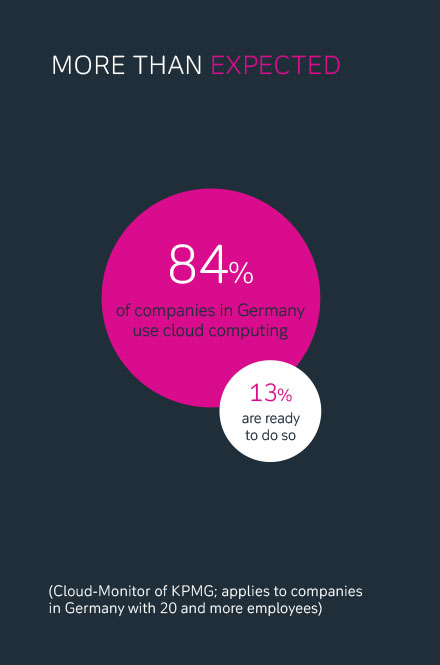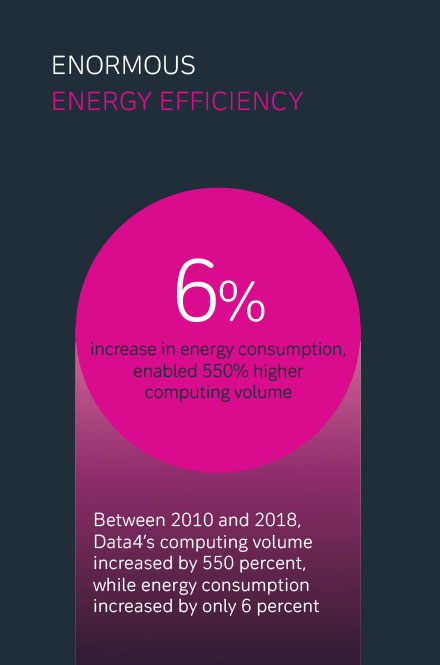
How is cloud technology silently revolutionising our economy?
Cloud technology is enabling new business models, and many private individuals are using it. For a long time, it was regarded as “technology in the background”. We show you the new possibilities – and what you should watch out for.
Its potential is said to be enormous: it should make work more flexible, faster and more productive, save start-ups from having to build their own infrastructure and offer private individuals more convenience. We are talking about cloud technology. Experts from the management consultancy McKinsey believe that companies have not yet begun to exploit the enormous potential, but are still scratching the surface.
In 2030, they expect more than a trillion dollars in potential run-rate earnings (EBITDA) for Fortune 500 companies alone – mainly due to potential savings and new business opportunities. The number will even rise, they say, as the cloud enables the adaption of emerging technologies such as blockchain and “augmented reality”. That means workers in the field are in hot demand. According to the Korn Ferry Institute, there will be a shortage of around 4.3 million IT specialists in the technology industry in 2030.

Chaitra Vedullapalli also sees this shortage of skilled workers. She is co-founder and chief marketing officer of Meylah, a US firm that helps companies modernize through the cloud. For her, though, the shortage of skilled workers is currently slowing the transition. Nevertheless, she sees cloud technology as an active driver that is digitizing the economy.
Because: every company and executive wants to use it now, she says. The Cloud Monitor of the management consultancy KPMG shows a similar picture. According to this, 84 percent of companies in Germany with 20 or more employees use cloud computing, while another 13 percent are on the threshold of entering the cloud.
How the cloud is changing or enabling business models
There are plenty of examples of how companies are using the cloud. And they come from companies in a wide range of industries, regions and sizes. In this dossier, we look at the story of Chileaf, a small Chinese company that makes smart fitness devices. To sell its heart rate monitors and smartwatches to Europe and the US, Chileaf uses the services of Chinese fintech XTransfer.
XTransfer, in partnership with multinational banks, offers incoming payment accounts that allow small Chinese merchants to receive payments in more than 200 countries and regions. In doing so, the start-up uses a sophisticated digital system to prevent fraud and money laundering. The basis for this is cloud technology: it provides the enormous computing power that enables XTransfer to automatically check customers' payment flows for suspicious cases.
The young company XTransfer also emphasizes another advantage of the cloud: flexibility. If the start-up grows strongly, it can rent additional capacities or reduce them if it does not need them at the moment.
This advantage of the cloud is also appreciated by large companies such as Deutsche Bank. In the future, it wants to use the cloud for the majority of its applications and also develop new solutions with it. To this end, the bank entered into a strategic partnership with Google Cloud in December 2020. The technology will be used, for example, to develop a new online banking platform.
Today, if we have a good idea and want to try it out, we can get started right away.
Samira Lauer, who heads a team of software experts at Deutsche Bank working on this new development, particularly appreciates the speed advantage of cloud technology. “In the past, you had to plan several months to sometimes a year in advance if you wanted to develop a product or a new function,” she says. “Today, if we have a good idea and want to try it out, we can get started right away. We then also see relatively quickly what works and what may not.”
How sustainable is cloud technology?

Flexibility, speed, scalability – because of these advantages, not only Deutsche Bank and XTransfer, but also numerous other companies rely on the cloud. So it's worth taking a closer look at the technology, which is actually still backed by very real, physical data centres. This closer look was provided by the French company Data4. Data4 operates 27 data centres in France, Italy, Spain, Luxembourg and Poland and is one of the European market leaders in the industry.
Against the backdrop of growing data volumes and the energy they require, Data4 is primarily concerned with one question: how can these data centres be operated sustainably? In this respect, the French company has already achieved some successes in the past. Although the computing volume increased by 550 percent between 2010 and 2018, energy consumption only increased by 6 percent.
But Data4 is also clear that further innovations are needed to ensure that data centres can be operated sustainably and efficiently in the future. To achieve this, the company is relying on renewable energy sources and AI.
And what about my privacy?
In addition to sustainability aspects, the question of data security will also determine the acceptance of the cloud. Especially among private individuals. We talked about this with Carsten Fischer, Deputy Head of Cybersecurity at Deutsche Bank. Fischer believes that the cloud comes across as more secure than conventional applications.
This is because cloud service providers specialize in security, he says. They also attract good people and have budgets that "far exceed” those of traditional firms. Companies can also contractually agree with cloud providers that the data of European customers remain in Europe. Read our interview with him to find out what two practical tips he has for private users.

Georg Berger
… is interested in the cloud in all its facets: in its ability to fundamentally change business models worldwide, but also in its risks for data protection. Above all, he wonders how technologies with such potential can be exploited with a low carbon footprint.
Recommended content
Digital Disruption | Opinion
"It’s not usually the cloud where security is compromised" “It’s not usually the cloud where security is compromised”
Whether for online banking or to back up files on a smartphone, many people consider it quite normal to use the cloud. How secure is it, though?
Digital Disruption | Crisp & Short
The cloud is everywhere The cloud is everywhere – many use it without even realising it
Global data volume is set to increase to 175 zettabytes in 2025. What role does the cloud play in this?
Digital Disruption | Outlook
“With Cloud we build a bridge of trust and enable trade” “With Cloud we build a bridge of trust and enable trade”
XTransfer facilitates foreign trade for small and medium enterprises from China. Their product would not be possible without cloud technology.






